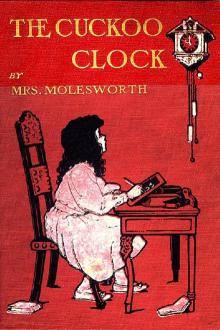The Magic Nuts, Mrs. Molesworth [books for men to read txt] 📗

- Author: Mrs. Molesworth
- Performer: -
Book online «The Magic Nuts, Mrs. Molesworth [books for men to read txt] 📗». Author Mrs. Molesworth
Hildegarde felt rather snubbed. It was the first time she had forgotten the fairy's warning.
'How very clever!' she said.
'Yes, indeed,' Leonore agreed. 'I shall always pick up horse-shoes when I see them now. And if you please, Mr. Gnome——'
But her sentence was never finished, for just as she had got so far, their guide suddenly clapped his hands. There came a rush of cold air in the children's faces, so sharply, that without knowing it, they both shut their eyes. And when they opened them again, the big chamber and the busy workers had disappeared—they found themselves—still in the under-world, but in quite a different part of it.
Here the light was no longer red, but a pale pretty green—a green which did not make things or people look pale and sickly, but only cast a soft radiance, such as one sees in the woods in the early spring. And to add to this impression there was a faint sound of running or trickling water near at hand.
Hildegarde and Leonore rubbed their eyes and looked at each other; they almost felt as if they were dreaming.
'Where have we got to?' said Leonore; but as she looked about her a little she saw that they were still surrounded by the high rocks which seemed to be the walls and boundaries of the under-world.
'And how did we get here?' added Hildegarde laughing. 'It felt as if we were blown here.'
'And so you were,' said a voice beside them, and turning, they caught sight of their old friend the gnome again. 'There was no object in tiring you with walking all through our domains—what brought you was one of our little inventions—the simplest in the world—for those who understand such things,' he added with condescension.
'And if you please where are we, and what are you going to show us now?' they inquired.
'You are at the entrance to our gardens, where I am going to show you our flower designs. You have doubtless never been told how many of your upper-world plants and flowers owe their existence to us.'
'Really!' exclaimed Hildegarde; and then, as a sudden thought struck her, 'oh, I wonder,' she cried, 'if those very, very queer flowers that we see in hot-houses and sometimes in gardens too—what do they call them—or—or—? I wonder if they are invented by your gardeners.'
The gnome smiled condescendingly.
'You mean orchids,' he said. 'Ah well, you will soon see for yourselves. And now,' he went on, 'I must bid you farewell, for the present at any rate, though who knows but that some day you may again visit the under-world. You will meet with no difficulties now. On leaving the gardens you may, if you like, pass through toy-land, and there you will see some of our children. That, I think, must be the limit of your sight-seeing—any more would be too much for you to take in. I have the honour to bid you adieu.'
He took off his cap with a flourish, bowing like a master of ceremonies.
'Goodbye, sir, and thank you very much,' said the little girls, but as they said the words, lo and behold the gnome had disappeared!
'That must be another of their inventions,' said Hildegarde, at which they both laughed.
All the same, in their hearts they were not quite sure if they were glad or sorry to be left to themselves, though neither liked to say so to the other.
They gazed about them. Behind were the rock passages they had grown accustomed to, but looking longer and dimmer, perhaps in contrast with the pale green light which had something more natural and more like the upper world about it.
And just in front of them was a curious sort of palisade—or paling—with openings at regular intervals, though too narrow to see anything through, unless one placed one's eyes quite close. And this it was not worth while to do, for another glance showed them a door in the paling, and a bell, of the same pattern as the one at the first entrance, only in silver instead of in bronze or copper.
Hildegarde rung it. The door opened almost at once, but no one was to be seen. So they walked in.
The change of scene was complete. It was a garden, but a very queer one. Instead of lawns of grass, there were wide spaces covered with fine glittering sand of different shades of green; the paths between were brown, and stooping closer to examine them the children found that they consisted of very small round pebbles, something like toffee drops, so smooth and yet elastic that they did not hurt the feet at all. But the flower-beds were the oddest of all. They were filled with plants and flowers of the strangest shapes and colours you can—or rather 'cannot'—imagine. And when Leonore put out her hand to touch one, she started in surprise; they were made of fine metal.
So far, they had seen no one, but just as they were beginning to wonder which way they should go, and if they were to meet no more of the inhabitants of gnomeland, they saw toddling towards them the very queerest little figure they had ever seen out of a picture-book! It was that of a very very old gnome—'the great-grandfather of all the gnomes surely,' whispered Hildegarde to Leonore. And it was with difficulty they restrained their laughter.
Nor was it easier to do so when the little man came closer to them. He was so very comical-looking. But mindful of the fairy's advice, both children kept perfectly grave and greeted the newcomer with a low courtesy.
'Well,' was all he said, and then stood wrinkling up his face, though you would have thought he could not screw it any higher than it was, and blinking up at them with his funny little eyes. Somehow they did not feel much in awe of him after all.
'Well?' he said again, this time in a more questioning tone of voice.
'If you please,' Hildegarde replied. 'May we walk through your—garden?' She could not help hesitating a little at the last word, for somehow the more she looked at the queer place they were in, the less like a garden it seemed. 'We won't pick any of the flowers.'
'You couldn't if you tried,' said the old gnome.
'Why not?' asked Hildegarde. 'I don't see any gardeners about.'
'They are all at their supper,' he replied.
'Supper,' replied Hildegarde. 'How early they must have it.'
'We don't know anything about late and early,' he said. 'But young things like them need plenty of food. Why, I don't believe the eldest of them is more than three hundred years old, counting the way you do up in your country.'
It was all the children could do not to call out in astonishment; they did not do so, however, fearing it might sound rude.
'Do you count gardening easy work, then, if you put such young gnomes to do it?' Leonore inquired.
The gnome nodded—a sort of nod that took in things in general——
'This kind of gardening—yes,' he replied. 'It's only dusting the plants, and straightening the stems if they are bent, and raking the beds and paths. Designing's a different thing—that takes experience. But you can stroll through if you like, and see for yourselves,' and with another nod, he toddled off again.
'How old must he be,' exclaimed Leonore in an awe-struck tone, 'if he counts hundreds of years nothing! I wonder what he meant by saying we could not pick flowers if we tried.'
Hildegarde walked on to where a border of strange blossoms, brilliant in colour and most grotesque in shape, stood in perfect motionlessness. She touched two or three of them gently before she spoke. Then——
'Leonore,' cried she, 'they're not flowers. They're made of metal.'
Leonore sprang forward.
'Oh that's what he meant by saying they needed "dusting" and "straightening,"' she exclaimed. 'Oh, Hildegarde, how queer everything is down here—don't you think we had better go home?'
'Not till we have seen a little more,' said Hildegarde. 'There's nothing to be afraid of. My fairy wouldn't have let us come if there could be anything to hurt us.'
'No—not exactly that,' said Leonore, 'but it's all so queer.'
'Come along quickly then,' Hildegarde replied. 'I don't care for this garden, if there's nothing really alive and growing in it. But I daresay we will soon get to somewhere else.'
And so, before very long, they did. They passed quantities of flower-beds and rows, so dazzling in colour and extraordinary in shape that they felt as if they were looking through some fantastic kaleidoscope.
Suddenly a rushing noise made them glance round in the direction whence it came. It was soon explained—a crowd of gnomes were racing towards them; on they came, running, jumping, chattering, and shouting at the top of their voices.
'It's the gardeners,' said Leonore. 'Oh, Hildegarde, I am rather frightened—they might play tricks on us. Do let us get out of their way,' and Hildegarde, to confess the truth, was not unwilling to do so.
'Let us run down here,' she said, turning as she spoke, for they were just then passing a side row of high plants which could hide them from view of the approaching crowd.
No sooner said than done. They set off running at full speed, scarcely glancing where they were going, the noise behind them lessening as they ran, till it ceased altogether; and breathless, but glad to have escaped the bevy of gnomes, they at last stood still.
'Now,' said Hildegarde, 'let's look about and see where we've got to.'
CHAPTER VII A COLLATION UNDER DIFFICULTIESD'une façon fort civile.
Le rat de ville et le rat des champs.
They were at the opposite side of the garden from that by which they had entered it, and just before them was a large white tent. A faint sound reached them—a rustle and murmur, as of people moving about busily, but not of voices. The tent appeared closed, but as they went nearer they saw that there were doors or flaps in the stuff it was made of, which could be opened either from within or without.
Hildegarde turned to Leonore.
'We may as well go in,' she said. 'We weren't told not to, and we want to see all we can.'
Leonore was looking a little frightened again.
'We can't knock,' she said; 'there's nothing to knock on. And we can't ring; there's no bell.'
'So the only thing is to walk in,' said Hildegarde.
She drew aside the first flap they came to, and both entered.
It was a busy scene. There was a table right round the tent, and at it gnomes were working actively. A moment's glance sufficed to show that they were packing, for queer-shaped boxes and baskets stood about, and quantities of moss. For a minute or so no one seemed to notice the visitors. These gnomes were evidently not of the young and giddy class; they did not seem to be speaking to each other at all. The children drew still closer to the table. The gnome nearest to them was laying a bright scarlet flower, in shape like a large pitcher with half a dozen small jugs hanging round it, in a basket well filled with moss. He glanced at the newcomers.
'If you please,' said Hildegarde, 'are you packing flowers?'
'You can see that for yourself,' was the reply.
'Yes,' she agreed, 'but we would like to know why you are doing it—I mean where are all the packages to be sent to, and what for?'
'Who sent





Comments (0)